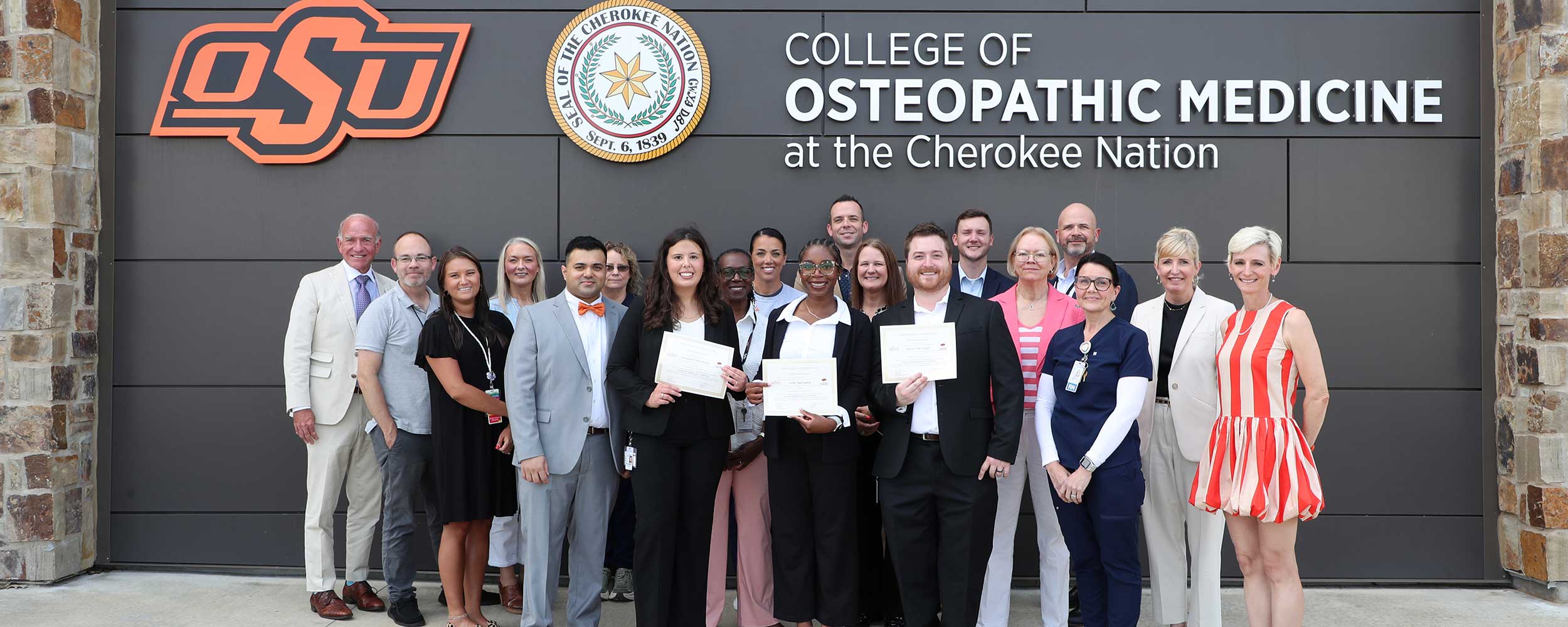
Lean Healthcare internship prepares med students to tackle hospital challenges
Wednesday, October 15, 2025
Media Contact: Kayley Spielbusch | Digital Communications Specialist | 918-561-5759 | kspielb@okstate.edu
The Oklahoma State University Center for Health Systems Innovation is equipping OSU College of Osteopathic Medicine students with the skills to address real-world problems in hospitals.
CHSI is a collaboration between the OSU Spears School of Business and the OSU Center for Health Sciences, leveraging both schools’ expertise to focus on business and clinical innovations in health care delivery.
One way CHSI is providing innovative health care solutions is through the Lean Healthcare Internship program.
Established in 2019, LHI is an annual initiative that recruits up to 12 first-year OSU-COM students for a monthlong, quality improvement (QI) internship that focuses on lean methodology.
“Lean methodology focuses on improving efficiency by identifying and eliminating activities that don’t add value, or waste resources,” said Ipe Paramel, project manager at CHSI. “It’s a process-oriented method of tackling real problems in health systems.”
Students begin the internship with a two-day lecture and simulation-based training on lean methodology and other QI tools. Then, it transitions into a monthlong internship with a partnering health system where students apply their training on a predefined project.
Each project addresses a health care process that was identified to be mutually beneficial to both the health system and student learning.
“Physicians are often held accountable for improving the health care system, yet standard medical education never teaches them about these systems and how to change them,” said Marjorie Erdmann, director of CHSI. “It is limited to graduate medical education, and there is little to no curriculum there. It’s a recognized problem, and this is our innovative solution.”
LHI is unique in that students are on-site performing analysis and gathering data. At the end of the internship, students present their findings and recommend improvements to hospital leadership and staff.
“This is the only graduate program that combines lecture and simulation-based training with real-world problem solving, allowing the concepts learned to be applied and reinforced immediately,” Paramel said.
Additionally, LHI is offered as a paid internship to medical students, whereas other lean methodology or QI trainings can cost thousands of dollars to attend.
"The [Lean Healthcare Internship] is the only graduate program that combines lectures
and simulation-based training with real-world problem solving, allowing the concepts
learned to be applied and reinforced immediately."
One problem studied by LHI interns is patients staying in the emergency department while they wait for an inpatient bed in the hospital. Student findings and recommendations reduced emergency room wait times by 13 minutes per patient, saving approximately 689 hours over nine months.
Paramel said LHI provides hospitals with a fresh set of eyes to tackle QI initiatives without consulting fees or added financial costs.
“Lean methodology is process-oriented and not focused on pointing fingers. Efforts instead promote workplace efficiency, incorporate staff input and boost morale while creating a culture of continuous improvement,” he said.
Lauren Streeter, a third-year medical student at OSU-COM, believes her experience as an LHI intern will help her future career as a physician.
“I have a deeper appreciation and understanding of all that must occur for health care to function. Each role is vital, and we must all work together to provide the best care to our patients,” Streeter said.
LHI expanded to the OSU-COM at the Cherokee Nation campus this last year, with three medical students as a part of the inaugural cohort. The expansion not only benefits OSU-COM CN students because they no longer have to commute to Tulsa to participate, but also builds on the existing partnership with the Cherokee Nation.
“Establishing a local cohort in Tahlequah also aligned with Cherokee Nation Health Services (CNHS) improvement initiatives as they prepare to migrate into a new building,” Paramel said. “Initiating the program this year not only addressed current processes but helped CNHS prevent inefficient or outdated practices from being transferred to the new site.”
To date, LHI has completed six QI initiatives — five at OSU Medical Center in Tulsa and one at W.W. Hastings Hospital in Tahlequah.
